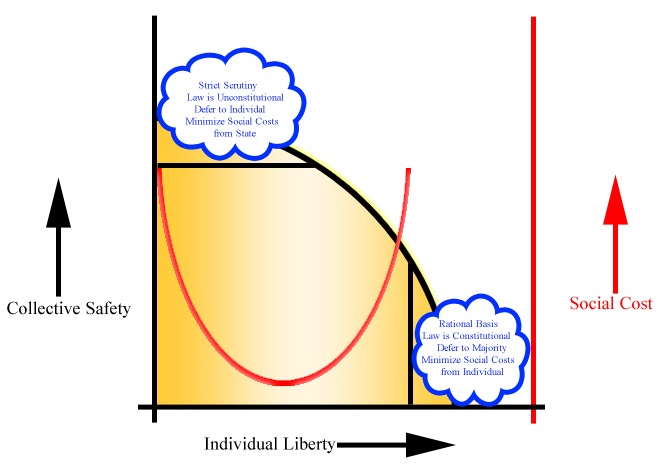Benjamin Wittes has a great post at Lawfare reconsidering the meaning of two classic quotes from Ben Franklin (“Those who would give up essential Liberty, to purchase a little temporary Safety, deserve neither Liberty nor Safety”) and Robert Jackson (“There is danger that, if the [Supreme] Court does not temper its doctrinaire logic with a little practical wisdom, it will convert the constitutional Bill of Rights into a suicide pact.”) about liberty and security. Wittes argues that both Franklin and Jackson meant the opposite of what people usually understand these quotes to mean. Wittes’ remarks mirror my writings on judging the constitutionality of social cost (see here and here).
As I explained, Franklin was not describing some grave tension between government power and individual liberty, in which one necessarily yielded civil liberties when one empowered government to protect people. He was describing, rather, effective self-government in the service of security as the very liberty it would be contemptible to trade away. Notwithstanding the way the quotation has come down to us, Franklin saw the liberty and security interests he was describing as aligned with one another. . . . In other words, like Franklin, Jackson was actually denying a stark balancing of liberty interests and security interests and asserting an essential congruence between them. Indeed, he was criticizing the court for believing that liberty and order must exist in some precarious balance in which the protection of one came at the expense of the other.
Indeed. Given a society with too much liberty, there would be no security. As I noted in a previous post, assume the liberty interest is the right to have sex with whomever one chooses. Commenter AJ wrote, this example “may seem like the epitome of an individual liberty, but have I really ‘secured’ this if I’m in danger of being lynched by a mob that disapproves of my choice of partner? (to choose another historical example).” In my taxonomy, the social cost of too much liberty, with not enough security, makes such polices undesirable. In terms of scrutiny, these types of law would defer to the state’s interest, and be skeptical of the individual’s liberty interest.
Jackson’s critique of the court was that by denying authorities the ability to maintain minimal conditions of order, it was empowering people who disbelieved in both freedom and order. The suicide pact to which he refers is the choice of anarchy with neither liberty nor security over a regime of ordered freedom. That’s actually much more similar to than different from what Franklin was asking for. Both were, after all, arguing for the ability of local democratic communities to protect their security—and liberty—through self-government.
Though the flipside of this dynamic is that if the power of the state grows too large, where high social costs from government power diminish individual liberty, these policies are similarly undesirable, through application of the same logic of Franklin and Jackson.
First Amendment law has long-since passed by Jackson’s specific point about what sort of utterances should and should not trigger liability for their propensity to cause violence. But his larger point still stands. One doesn’t maximize either liberty or security at the other’s expense. It’s curious how two famous quotations that both invoke this complex the have both come to stand for precisely the zero-sum balancing that the speakers were rejecting.

Wittes concludes that liberty and security need not be a zero-sum game, where the increase in one results in the decrease of another. This dynamic is reflected in the Posner/Vermeuel curve where liberty and security can be varied independently when a policy exists below the social cost frontier.
In this orange-shaded region, liberty and safety can be varied without affecting each other. Considering the Posner/Vermeule curve, a change from policy Q* to Q results in an increase in individual liberty without a concomitant decrease in security. Likewise, a change from policy R* to R results in an increase in security without a concomitant decrease in liberty. With these policies, liberty can be increased without decreasing safety, and safety can be increased without decreasing liberty. As the authors noted, “[o]f course, not every issue of security policy presents such a tradeoff. At certain levels or in certain domains, security and liberty can be complements as well as substitutes. Liberty cannot be enjoyed without security, and security is not worth enjoying without liberty.”
